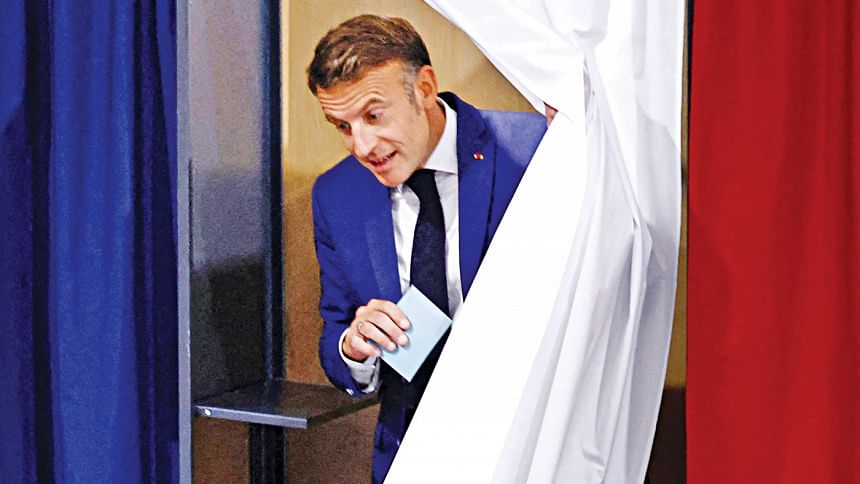France kicks off 2nd round of polls

France yesterday prepared for its most consequential legislative election of recent times, with residents of overseas territories opening voting for a poll expected to give the far right its biggest ever presence in parliament.
A traditional final day pause was observed yesterday ahead of today's second round runoff after a frenetic campaign that saw tensions rise across the country and dozens of attacks on candidates.
Underlining France's global footprint that spans the oceans of the world, the first French region to vote was Saint Pierre and Miquelon, a small French archipelago off the coast of Canada where citizens began voting from 1000 GMT.
They were to be followed yesterday by residents of French Caribbean territories including Martinique and Guadeloupe as well as Guiana in South America.
French Pacific territories come next before people in mainland France cast their ballots from 0600 GMT today.
Polls will close by 1800 GMT today when projections of seat numbers, regarded in France as a firm indicator of the final outcome, are published.
Final opinion polls on Friday suggested that far-right leader Marine Le Pen's National Rally (RN) would fall short of winning an outright 289 seat majority in the 577-member National Assembly while being the largest party ahead of the New Popular Front (NFP) left-wing coalition.
Yet President Emmanuel Macron's gamble in calling snap elections could end with his centrist alliance having approximately half the number of deputies it had before the elections and the RN double.
The final opinion polls published by two organisations Friday projected the RN would win between 170-210 seats, followed by the New Popular Front left-wing coalition on 145-185 seats and Macron's centrists on 118-150 seats.
Macron now faces the final three years of his presidency with no clear ruling majority, and Prime Minister Gabriel Attal perhaps trying to hold together a caretaker government.
"Today the danger is a majority dominated by the extreme right and that would be catastrophic," Attal said in a final pre-election interview with French television on Friday.
According to pollsters Ipsos and Ifop, anti-immigrant, eurosceptic RN could secure 170 to 210 seats in the National Assembly, well short of 289, an absolute majority.
French voters could therefore go to bed tonight with no idea who might be able to form and lead a government, or whether a weakened Attal would shoulder on.
Le Pen insists that she is still on course for victory and an absolute majority that would force Macron to appoint her 28-year-old lieutenant Jordan Bardella as prime minister.
Attal vowed to stay on "as long as necessary" in a caretaker role, while Macron's office is studying options to maintain some form of government.
Macron is to remain in office until presidential and legislative elections in April 2027, but he must now face the possibility of sharing power with political foes.
The prospect of France forming its first far-right government since World War II has dismayed its European allies, already perplexed by Macron's gamble on a snap poll.
It also has left up in the air who will be in charge of the French government when the Olympic Games begin in Paris on July 26.
In an effort to halt the far-right rise seen in the first round of voting on June 30, centrists and left-wing parties formed second round polling pacts.
Le Pen has denounced the move as a bid to steal victory "against the will of the people" by creating what she calls a "single party" to protect the political class.
But it is far from certain how many voters who saw their preferred candidates drop out to give another a clear run against the RN will turn out today, with anti-RN figures saying nothing should be taken for granted.
"Contrary to what we are all hearing, it is not at all guaranteed as we speak," Raphael Glucksmann, who led the Socialist list in European elections, warned on Friday.
With so much of the outcome uncertain, tensions are rising.
More than 50 candidates and campaign activists have been physically assaulted during the four-week campaign, the shortest in modern French history.
About 30,000 police, including 5,000 in Paris, will be deployed this weekend to head off trouble.

 For all latest news, follow The Daily Star's Google News channel.
For all latest news, follow The Daily Star's Google News channel. 



Comments